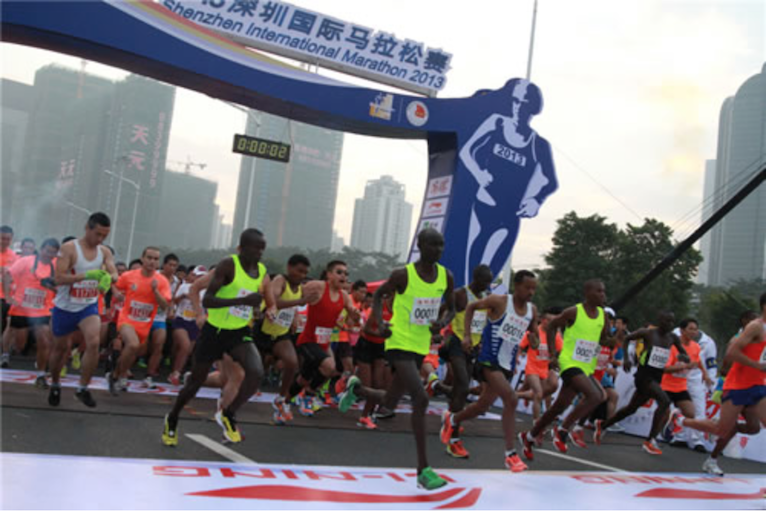Edwin Koech Shatters Shenzhen Marathon Course Record
16th December 2018
Organisers step up measures to avoid a repeat after 258 runners were caught cheating in the city's Nanshan half three weeks ago in an embarrassing incident for the growing Chinese distance running sector

- The 26-year-old Koech enjoyed a comfortable sole lead after 25 kilometres to wrap up the victory in 2:09:44, which was also his second sub-2:10 run behind his personal best of 2:07:13 achieved in Milan last April
- Seboka broke away from Kenyan veteran Flomena Chepchirchir near the halfway mark and when she passed the 25-kilometre water stations in 1:26:27, the margin had been widened to some 10 seconds
- The 37-year-old Chepchirchir, who finished 10th in Shenzhen last year, took second place in 2:32:05, which was her best mark since achieving her PB of 2:23:00 back in 2013
SHENZHEN, China- Kenya’s Edwin Kipng'etich Koech produced the Shenzhen Marathon’s first ever sub-2:10 performance, while Ethiopia’s Mulu Seboka improved the women’s course record by more than six minutes at the IAAF Silver Label road race on Sunday.
The 26-year-old Koech enjoyed a comfortable sole lead after 25 kilometres to wrap up the victory in 2:09:44, which was also his second sub-2:10 run behind his personal best of 2:07:13 achieved in Milan last April.
A leading group of more than 10 runners paced the race in the early stages. Only five men were left when the leaders passed the 20-kilometre mark, and that pack was trimmed to just three runners – Koech, his compatriot Samuel Ndungu and Bekele Muluneh of Ethiopia – by the time they hit 25 kilometres in 1:17:09.
After covering the five-kilometre section between 25 and 30 kilometres in 14:41, Koech broke and built up a lead of more than half a minute and never looked back before breaking the tape in style.
The 21-year-old Muluneh improved his PB by 40 seconds to finish second in 2:11:19. Ndungu, a two-time Lake Biwa marathon winner with a PB of 2:07:04, settled for third place in 2:12:15.
Convincing win
Pre-race favourite Seboka lived up to expectations in the women’s race. She won in 2:27:12 to improve on her runner-up finish from last year while taking down the course record of 2:33:25 set by last year’s winner Viktoria Poliudina of Kyrgyzstan.
Seboka broke away from Kenyan veteran Flomena Chepchirchir near the halfway mark and when she passed the 25-kilometre water stations in 1:26:27, the margin had been widened to some 10 seconds.
The 34-year-old Ethiopian kept extending her lead and claimed the convincing win with an advantage of nearly five minutes.
It is Seboka’s second title in China this year as she also won the Dalian International Marathon in 2:28:59 seven month ago. The in-form Ethiopian has finished within 2:30 in each of her three outings in 2018 with a season’s best of 2:25:01 registered in Seoul.
The 37-year-old Chepchirchir, who finished 10th in Shenzhen last year, took second place in 2:32:05, which was her best mark since achieving her PB of 2:23:00 back in 2013.
Ashu Kasim of Ethiopia was a remote third-place finisher with a clocking of 2:38:35.
The marathon took place under scrutiny, after 258 runners were caught cheating in the Shenzhen Nanshan half marathon three weeks ago.
Eighteen runners with fake bib numbers and three running on behalf of others were given lifetime bans from the event. The other 237 runners, of whom a great number had taken shortcuts, were banned for two years.
This time, Shenzhen organizers had vowed to avoid a repeat of last month's incident, using microchipped wristbands, facial recognition technology, and extensive video monitoring in order to prevent cheating.
"We employed several measures to avoid the possibility of cheating, making it almost impossible to cut corners or use fake bibs," an organizing committee official surnamed Song told Xinhua.
Organizers said the facial recognition technology was capable of identifying unregistered runners, while wristbands fitted with electronic chips were able to accurately record competitors' times as they passed through the course's timing mats, allowing organizers to identify runners suspected of taking shortcuts.
"These are only preventative measures, and we hope the runners choose to respect the sporting spirit of the marathon," Song added.
In addition, organizers also stationed 224 referees and over 3,000 volunteers at various points along the course, and made an official announcement on Wednesday urging runners to "keep to the rules and respect the sporting spirit".
The announcement added that competitors wearing fake bibs or running on behalf of others would face a lifetime ban from the event.
Marathon running has surged in popularity in China in recent years. The number of marathons and road races staged in the country grew from just 22 in 2011 to 1,072 this year, according to the Chinese Athletics Association (CAA).
But with marathon running still in its infancy in China, such rapid growth has resulted in a few teething problems for runners and organizers alike.
